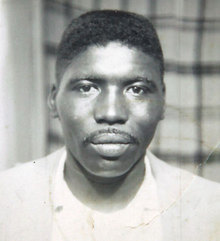Jimmie Lee Jackson
| Jimmie Lee Jackson | |
|---|---|
 |
|
| Born |
December 16, 1938 Marion, Alabama, U.S. |
| Died | February 26, 1965 (aged 26) Marion, Alabama, U.S. |
| Cause of death | Gunshot wound |
| Occupation | Deacon, activist |
| Organization | Southern Christian Leadership Conference (SCLC) |
| Movement |
Civil Rights Movement Peace movement |
Jimmie Lee Jackson (December 16, 1938 – February 26, 1965) was a civil rights activist in Marion, Alabama, and a deacon in the Baptist church. On February 18, 1965, while participating in a peaceful voting rights march in his city, he was beaten by troopers and shot by Alabama State Trooper James Bonard Fowler. Jackson was unarmed and died eight days later in the hospital.
His death was part of the inspiration for the Selma to Montgomery marches in March 1965, a major event in the Civil Rights Movement that helped gain Congressional passage of the Voting Rights Act of 1965. This opened the door to millions of African Americans being able to vote again in Alabama and across the South, regaining participation as citizens in the political system for the first time since the turn of the 20th century, when they were disenfranchised by state constitutions and discriminatory practices.
In 2007 former trooper Fowler was indicted in Jackson's death, and in 2010 he pleaded guilty to manslaughter. He was sentenced to six months in prison.
Jimmie Lee Jackson was a deacon of the St. James Baptist Church in Marion, Alabama, ordained in the summer of 1964. Jackson had tried to register to vote for four years, without success under the discriminatory system maintained by Alabama officials. Jackson was inspired by Martin Luther King, Jr., who had come with other Southern Christian Leadership Conference (SCLC) staff to Selma, Alabama, to help local activists in their voter registration campaign. Jackson attended meetings several nights a week at Zion's Chapel Methodist Church. His desire to vote led to his death at the hands of an Alabama State Trooper. It inspired Southern Christian Leadership Conference leader James Bevel to initiate and organize the dramatic Selma to Montgomery marches, which directly contributed to President Lyndon Johnson calling for, and Congress passing, the Voting Rights Act of 1965.
...
Wikipedia
